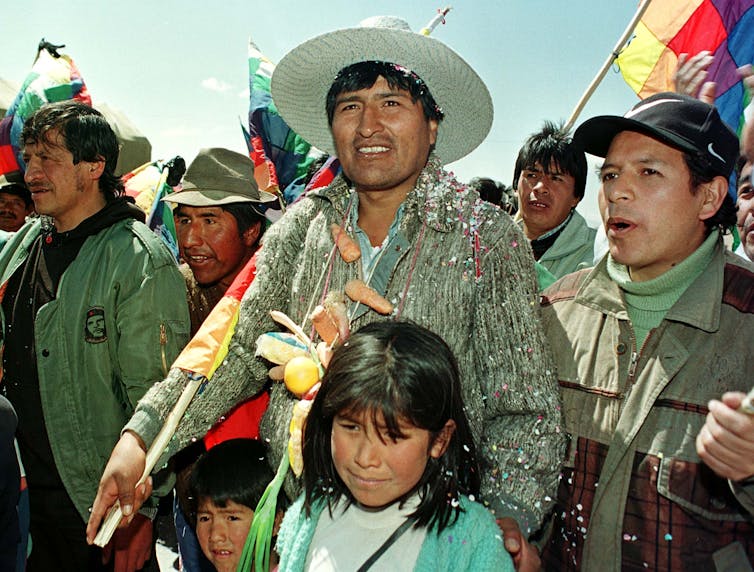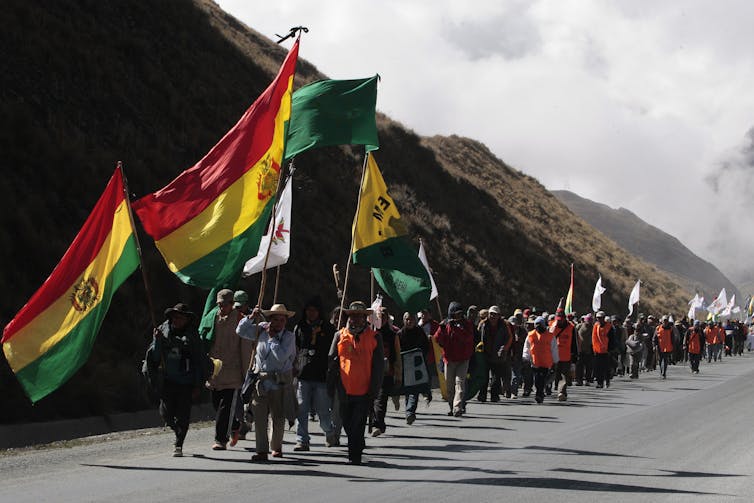Bolivia is not Venezuela – even if its president does want to stay in power forever
- Written by Robert Albro, Research Associate Professor, American University
When Latin America’s elected leaders gather in Peru later this week to discuss democracy in their region[1], one topic will likely be high on the agenda: Venezuela, which was barred from attending this year’s Summit of the Americas[2] because it has an authoritarian government.
Several countries have criticized Venezuela’s exclusion, chief among them Bolivia[3]. Bolivian president Evo Morales, a close ally of its late populist president Hugo Chávez, has long defended the Venezuelan regime against its foreign critics.
Venezuela and Bolivia are so politically tied, in fact, that it has some democracy observers concerned[4]. Is Morales taking Bolivia down the same dangerous path that led nearby Venezuela into dictatorship?
Bolivia looks a little like Venezuela
In 2016, Bolivian voters rejected a referendum[5] on whether incumbent presidents – then limited to two consecutive five-year administrations[6] – should be able to run for reelection. Morales, then in his third term because of a technicality related to Bolivia’s new 2009 Constitution, promised to respect[7] the “will of the people.” No fourth term, he said.
That was then. Morales has since decided to run for reelection next year after a December 2017 Supreme Court ruling abolishing term limits for Bolivian elected officials[8].
As social scientists who specialize in Latin America, we understand the temptation now to compare Bolivia with Venezuela. Both countries have embraced charismatic political leaders who run their nations by force of personality.
President Chávez, who ruled Venezuela from 1999 to 2013, consolidated his power by abolishing term limits[9], attacking judicial independence[10] and curtailing press freedoms[11]. He died shortly into his third term.
Chávez’s hand-picked successor, Nicolás Maduro, has expanded these tactics[12], jailing dissidents and neutering Parliament. Despite overseeing the country’s descent into economic chaos[13], Maduro is widely expected to win his bid for a second term in 2018. Most opposition candidates are either imprisoned or banned from politics[14].
Bolivia and Venezuela are also outspoken critics of the United States and founding members of the so-called Bolivarian Alliance[15], a leftist grouping of Latin American and Caribbean nations started by Chávez and Fidel Castro in 2004.
After the White House passed sanctions against Venezuela, in November 2017, Morales bristled[16]. “Latin America is no longer a Yankee colony,” he exclaimed.
 Morales made his name in the 1990s and early 2000s leading protests against the Bolivian government.
David Mercado/Reuters
Morales made his name in the 1990s and early 2000s leading protests against the Bolivian government.
David Mercado/Reuters
No oil diplomacy
There are, however, pronounced political and social differences between Bolivia and Venezuela that should prevent Morales from following in Chávez’s footsteps.
Bolivia’s resources pale in comparison to Venezuela’s. Petroleum gas is Bolivia’s main export[17], but Venezuela has the world’s greatest crude oil reserves[18].
Chávez used Venezuela’s oil riches to shower benefits on Bolivia and other neighbors, sending subsidized oil to countries across Central America and the Caribbean[19].
Today, Maduro needles the United States by having Citgo – a U.S.-based subsidiary of the state-owned Petróeos de Venezuela – provide cheap gasoline to Americans in need[20]. The company recently offered US$5 million in oil aid to victims of Hurricane Harvey in Texas[21].
Morales has stewarded Bolivia’s economy well, and gross domestic product has tripled during his 12 years in office[22]. But Bolivia’s economy is still one-fifth the size of Venezuela’s, and the country ranks among the poorest nations in South America[23].
Morales is the president of a small, landlocked Andean nation. He simply cannot wield his country’s wealth, Chávez-style, to win friends and antagonize enemies.
Constraints on power
Bolivia’s booming economy has certainly empowered Morales at home, allowing him to fund a range of popular social programs[24]. These include cash payments to poor families, a minimum wage hike, pensions for people with disabilities and major infrastructure projects.
Quality of life has gone up enormously since Morales was first elected in 2005. Between 2005 and 2016, the population living in poverty declined from 61 percent to under 40 percent[25].
Such successes have largely muted Morales’s domestic critics. But he is also constrained domestically, kept in check by the same social movements that catapulted him to power.
Morales’s political career began when he was elected to head Bolivia’s largest federation of coca growers in 1988, a post he still holds.
Coca leaf[26], the active ingredient in cocaine, is a mild stimulant traditionally chewed or brewed as tea throughout the Andean highlands. Coca has been legal in Bolivia since 2004[27].
Under Morales’s leadership, the coca farmers – who, like most Bolivians, are ethnically indigenous[28] – militantly resisted such U.S.-backed state counternarcotics policies[29] as forced eradication, fumigation and crop substitution schemes.
Indigenous resistance
Morales gained national prominence in the early 2000s when he led numerous mass marches and strikes[30] to protest government efforts to privatize utilities and tax public employees’ salaries.
Throughout this period, Morales claimed to be “leading by obeying[31]” his constituency. He relied on popular referendums to inform his policies and respected the collective decision-making processes typical of Bolivia’s indigenous communities.
As such, he said, his actions directly represented the people’s will.
Morales has continued to make this claim as president. He describes his Movimiento al Socialismo, or MAS, not as a political party – though technically it is – but as an expression of Bolivian social movements[32].
His legitimacy thus depends on faithfully advancing the priorities of the MAS’s grassroots and indigenous base. Whenever his supporters believe that Morales is imposing his own political agenda, they’re quick to oppose him.
In 2011, Morales was forced to abandon plans to build a highway[33] through a national park occupied by indigenous communities after over 1,000 local residents undertook a 360-mile protest march to Bolivia’s capital. They were violently repressed by police along the way.
 Bolivian indigenous resistance can be a powerful check on Morales’s power.
David Mercado/Reuters
Bolivian indigenous resistance can be a powerful check on Morales’s power.
David Mercado/Reuters
When he recently decided to revive the road project, indigenous residents of the park again mobilized in resistance[34].
Similarly, Morales’s decision to ignore the results of the 2016 referendum on term limits spurred swift retaliation. The president’s approval ratings[35] – which have hovered around 75 percent[36] – dropped as much as 50 percent, according to some polls[37].
A distinctly Bolivian leader
Morales’s desire to stay in office indefinitely may recall Venezuela’s Chávez. But ultimately we see him as a distinctly Bolivian kind of left-wing leader, constrained by economic and political forces that do not exist in Venezuela.
To win Bolivia’s October 2019 presidential election, Morales must uphold the social contract he made with the country’s popular and indigenous majority.
If Morales takes a Chávez-like turn, we believe Bolivians will ensure that his fourth term is a short one. After all, authoritarianism is the antithesis of “leading by obeying.”
References
- ^ discuss democracy in their region (www.summit-americas.org)
- ^ barred from attending this year’s Summit of the Americas (www.reuters.com)
- ^ chief among them Bolivia (www.telesurtv.net)
- ^ some democracy observers concerned (www.washingtonpost.com)
- ^ rejected a referendum (www.reuters.com)
- ^ limited to two consecutive five-year administrations (www.bbc.com)
- ^ promised to respect (www.theguardian.com)
- ^ abolishing term limits for Bolivian elected officials (www.nytimes.com)
- ^ abolishing term limits (www.theguardian.com)
- ^ attacking judicial independence (www.hrw.org)
- ^ press freedoms (cpj.org)
- ^ expanded these tactics (www.nytimes.com)
- ^ descent into economic chaos (theconversation.com)
- ^ Most opposition candidates are either imprisoned or banned from politics (www.nytimes.com)
- ^ Bolivarian Alliance (albainfo.org)
- ^ bristled (www.telesurtv.net)
- ^ main export (atlas.media.mit.edu)
- ^ world’s greatest crude oil reserves (money.cnn.com)
- ^ Central America and the Caribbean (www.atlanticcouncil.org)
- ^ provide cheap gasoline to Americans in need (www.bloomberg.com)
- ^ Hurricane Harvey in Texas (www.washingtonpost.com)
- ^ gross domestic product has tripled during his 12 years in office (search.proquest.com)
- ^ among the poorest nations in South America (data.worldbank.org)
- ^ popular social programs (www.theguardian.com)
- ^ from 61 percent to under 40 percent (www.telesurtv.net)
- ^ Coca leaf (theconversation.com)
- ^ legal in Bolivia since 2004 (news.vice.com)
- ^ ethnically indigenous (www.boliviainfoforum.org.uk)
- ^ resisted such U.S.-backed state counternarcotics policies (nacla.org)
- ^ led numerous mass marches and strikes (www.washingtonpost.com)
- ^ leading by obeying (www.theguardian.com)
- ^ social movements (www.wilsoncenter.org)
- ^ plans to build a highway (newint.org)
- ^ indigenous residents of the park again mobilized in resistance (www.theguardian.com)
- ^ The president’s approval ratings (www.reuters.com)
- ^ have hovered around 75 percent (www.lavozdelsandinismo.com)
- ^ as much as 50 percent, according to some polls (www.bloomberg.com)
Authors: Robert Albro, Research Associate Professor, American University

